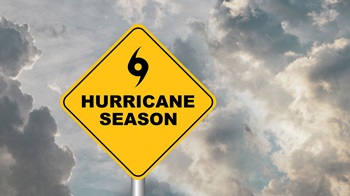May 4-10, 2025 is National Hurricane Preparedness Week, an effort to raise awareness about hurricane hazards and provide information for preparation and action.
By: Doug Baker, Vice President, Industry Relations, FMI
As someone who began his career as a grocer, I understand firsthand the challenges natural disasters bring to our industry. When hurricanes, floods, or wildfires hit, the pressure to keep food on the shelves and provide for our communities is immense. That's why, for me, it's a personal privilege to serve FMI members during these tough times.
At FMI, our mission is to help you navigate these storms, not just by offering guidance and advocacy, but by standing with you, side by side, as you ensure your communities have access to the essentials they need. Whether through tools like the SISE-NET Hub, which centralizes disaster planning and recovery resources, or the collaboration we facilitate between retailers and suppliers, I'm committed to ensuring that we, together, can overcome any crisis that comes our way.

Serving you in times of need isn't just part of my job — it's personal.
Here's how FMI serves our members during natural crises:
Crisis Management Resources
FMI provides real-time updates and expert guidance to help navigate supply chain disruptions during natural disasters. Members gain access to best practices, tools and strategies for business continuity, inventory management, rerouting logistics, handling perishable goods, ensuring food safety, and maintaining regulatory compliance — all designed to minimize shortages and delays.
Advocacy
During a crisis, FMI advocates at the federal and state levels to prioritize the food supply chain. We may work with government agencies like FEMA and USDA to secure waivers or policy adjustments that allow for faster transportation of goods or temporary relief.
Communication, Collaboration and Networking
FMI acts as a Communication Hub and a platform for Collaboration and Networking, especially in times of crisis. Serving as a bridge between members and key stakeholders — retailers, suppliers and government agencies — FMI facilitates the timely exchange of critical information. Daily calls and call notes keep companies informed on decisions related to inventory, shipments and employee safety. This coordination streamlines efforts to deliver essential goods quickly when local resources are strained. During natural disasters, for example, FMI helps retailers and suppliers reroute supplies, share warehouse space and pool resources to get products to market faster. Members gain valuable insights and partnerships that help mitigate the impact of the crisis.
Food Safety and Compliance
FMI helps members uphold food safety standards during crises by providing guidance on preventing contamination, complying with regulations, and safely restoring operations after a natural disaster.
I've lived this experience, and I know it's not just about keeping shelves stocked — it's about being there for your neighbors, employees, and customers when they need you the most. That's why FMI is here for you — every step of the way. Because when we come together, we can weather any storm. Stay strong, stay connected, and know that we are in this together.


 Industry Topics address your specific area of expertise with resources, reports, events and more.
Industry Topics address your specific area of expertise with resources, reports, events and more.
 Our Research covers consumer behavior and retail operation benchmarks so you can make informed business decisions.
Our Research covers consumer behavior and retail operation benchmarks so you can make informed business decisions.
 Events and Education including online and in-person help you advance your food retail career.
Events and Education including online and in-person help you advance your food retail career.
 Food Safety training, resources and guidance that help you create a company food safety culture.
Food Safety training, resources and guidance that help you create a company food safety culture.
 Government Affairs work — federal and state — on the latest food industry policy, regulatory and legislative issues.
Government Affairs work — federal and state — on the latest food industry policy, regulatory and legislative issues.
 Get Involved. From industry awards to newsletters and committees, these resources help you take advantage of your membership.
Get Involved. From industry awards to newsletters and committees, these resources help you take advantage of your membership.
 Best practices, guidance documents, infographics, signage and more for the food industry on the COVID-19 pandemic.
Best practices, guidance documents, infographics, signage and more for the food industry on the COVID-19 pandemic.
